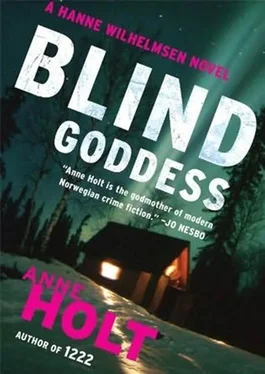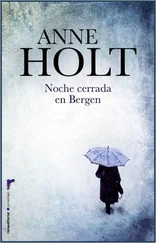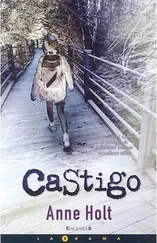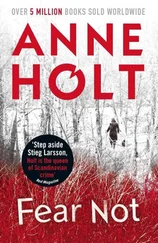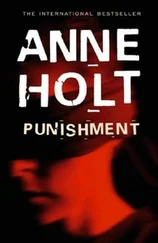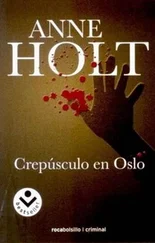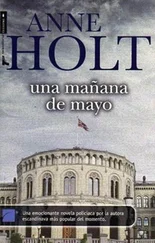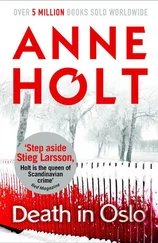He was sitting on a hard spindleback chair. Strictly speaking there was only space for two chairs in the eight-square-metre room, which also housed a solid and rather stately double filing cabinet, three rows of ugly painted-steel bookshelves full of ring-binders arranged by colour, and a desk. This was fixed to the wall with metal brackets, so that the desktop was on a slant. That’s how it had been ever since the medical officer had had the idea of subjecting the staff to an ergonomics therapist. Sloping work desks were supposed to be good for the back. No one understood why, and most of them had found that their spinal problems were exacerbated by all the groping around on the floor for the things that slid off the desk. With an extra chair in the room it was hardly possible to move about without shifting the furniture.
The office belonged to Hanne Wilhelmsen. She was strikingly attractive, and newly promoted to Inspector. After coming out top of her year from police college, she had spent ten years at Oslo police headquarters marking herself out as a policewoman perfectly designed for an advertising campaign. Everyone spoke well of Hanne Wilhelmsen, a unique achievement in a workplace where ten percent of the day was spent running down your colleagues. She deferred to superiors without being branded an arse-licker, yet was not afraid to voice her opinions. She was loyal to the system, but would put forward suggestions for improvement that were usually sound enough to be implemented. Hanne Wilhelmsen had the intuition that only one in a hundred police officers has, the fingertip sensitivity that tells you when to coax and trick a suspect, and when to threaten and thump the table.
She was respected and admired, and well deserved it. But even so there was no one in that big grey building who really knew her. She always went to the annual departmental Christmas parties, to the summer party, and to birthday celebrations, was a fantastic dancer, would talk about the job and smile sweetly at everyone, and would go home ten minutes after the first person had left, neither too early nor too late. She never got drunk, and so never made a fool of herself. And no one ever got any closer to knowing her.
Hanne Wilhelmsen was at ease with herself and the world, but had dug a deep moat between her professional life and her private life. She didn’t have a single friend in the police force. She loved another woman, a defect in this otherwise perfect human being, the public admission of which she was convinced would destroy everything she had spent so many years building up. A swing of her long dark-brown hair was enough to deflect any questions about the slim wedding ring that was the only jewellery she wore. She had been given the ring by her partner when they first moved in together at the age of nineteen. There were rumours, as there always are. But she was so pretty. So womanly. And the female doctor that a friend of someone’s friend vaguely knew, and that others had seen Hanne with several times, was also very beautiful. They were really feminine women. So there couldn’t be any truth in it. Anyway Hanne always wore a skirt the few times she had to dress in uniform, and hardly anyone did that, since trousers were so much more practical. The rumours were just malicious nonsense.
Thus she lived her life, in the knowledge that what is not confirmed is never regarded as actually true; but this made it even more important for Hanne to perform well in her job than for anyone else in the building. Perfection was her shield. Which was how she wanted it, and since she had absolutely no ambition to elbow her way to the top, but was only interested in doing a good job, there was no jealousy or envy to threaten her defences.
She smiled now at Håkon, who had seated himself in the extra chair.
“Don’t you trust me to ask the right questions?”
“Relax. No worries on that score. But I have a feeling we’re on to something bigger here. As I said, if you don’t mind too much, I’d rather like just to sit in on the interview.
“It’s not against the rules,” he added quickly.
He knew she insisted on following the statutory procedures whenever possible, and he respected her for it. It was unusual for a police attorney to attend the questioning of a suspect, but it wasn‘t precluded. He’d done the same before on occasion. Usually to study the technique, but sometimes because he was particularly involved in a case. Normally the police officers didn’t object to the presence of the prosecution staff. On the contrary, provided he kept a low profile and didn’t interfere in the interrogation, most of them seemed quite pleased.
As if at a given signal, they both turned towards the prisoner. Hanne Wilhelmsen put her right arm on the desk and let her long lacquered nails play on the keys of an old electric typewriter. It was an IBM golf ball machine, very advanced in its time. Now it lacked the e, which was so worn that it produced only a smudged black mark from the ribbon when you hit the key. It didn’t really matter, since it was quite obvious what the smudge should be.
“It’ll be a long day if you’re just going to sit there and say nothing.”
Her voice was gentle, almost indulgent.
“I get paid for this. Chief Inspector Sand gets paid. You on the other hand will just carry on being held here. Sooner or later we might let you go. Wouldn’t you like to make it sooner?”
For the first time the young man seemed less confident.
“My name is Han van der Kerch,” he said, after a few minutes’ further silence. “I’m Dutch, but I’m residing in the country legally. I’m a student.”
Now Håkon Sand had his explanation for the perfect yet not fully idiomatic Norwegian. He remembered his boyhood hero Ard Schenk, remembered himself as a thirteen-year-old thinking that the man spoke an unbelievably good Norwegian for a foreigner. And he remembered reading Gabriel Scott’s Dutchman Jonas, a book he had loved as a child and which had contributed to his later unwavering support for the orange shirts in international football championships.
“That’s all I’m prepared to say.”
Once again there was silence. Håkon waited for Hanne Wilhelmsen’s next move. Whatever it might be.
“Well, that’s okay by me. It’s your choice, and your right. But we’ll be sitting here for some time in that case.”
She had inserted a sheet of paper in the typewriter, as if she already knew that she would get something to take down.
“You might as well hear a theory we have.”
The chair leg scraped on the linoleum as she pushed it back. She offered the Dutchman a cigarette, and lit one herself. The young man seemed grateful. Håkon was less pleased, and leaning back in his chair pushed the door ajar to create a through-draught. The window was already slightly open.
“We found a body on Friday evening,” said Hanne Wilhelmsen in a soft voice. “It was a bit of a mess. He obviously hadn’t wanted to die. At least not in such a horrible way. There must have been a lot of blood around. You were pretty well covered in it when we found you. We can be a bit slow here in the police sometimes. But we’re still capable of putting two and two together. As a rule we get four, and we think we’ve got four now.”
She stretched behind her for an ashtray on the bookshelf. It was a tasteless souvenir from southern climes made of brown bottle glass, featuring a faun in the centre wearing an evil grin and sporting an enormous erect phallus. Not exactly Hanne Wilhelmsen’s style, thought Sand.
“I’ll happily be more explicit.”
Her voice was sharper now.
“We’ll have a preliminary analysis of the blood on your clothes tomorrow. Which-if it matches the blood of our faceless friend-will be more than enough to justify keeping you in custody. We can have you in for interrogation whenever we like. Over and over again. A week might pass before you hear from us, then we’ll suddenly turn up again, perhaps after you’ve gone to sleep. We’ll question you for an hour or two, you’ll refuse to say anything, we’ll take you back, and then fetch you out again. It can be rather wearing. For us too, of course, but we can take it in turns. It’s worse for you.”
Читать дальше
